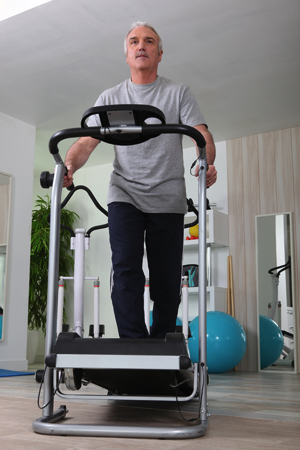
Our muscles stiffen as we age, including the heart muscles. However, a new study showed that middle aged adults who took up moderate- to high-intensity exercise developed the heart flexibility of someone 15 to 20 years younger. But there is a sweet spot in midlife for this to work. Similar studies on 70-year-olds did not produce the same results.
Going into midlife with a sedentary lifestyle causes the heart to stiffen, shrink, and become less efficient at pumping blood and oxygenating the body. As a result, people develop shortness of breath, fatigue, edema, coughing, and other symptoms of heart disease.
For the two-year study, researchers tracked more than 50 volunteers who ranged in age from 45 to 64. They were healthy but sedentary. The participants were divided into two groups.
The first group did non-aerobic exercise three days a week, including basic yoga, balance training, and weight training.
The second group did moderate- to high-intensity aerobic exercise four days a week. Compared to the first group, this group saw dramatic improvements in their heart health.
Their hearts became noticeably more flexible and could process oxygen more efficiently. One researcher in the study said they were able to take a 50-year-old heart and turn back the clock to a 30- or 35-year-old heart.
These participants became stronger and fitter overall because their more flexible hearts were able to fill with more blood and pump more blood to the rest of their bodies during exercise.
The group who did the non-aerobic exercise three days a week saw no change in their heart flexibility or efficiency.
Interval training is key to a healthier heart
The key to the study subjects’ dramatic heart health improvement wasn’t just aerobic exercise, but aerobic exercise that incorporates interval training — short bursts of high intensity with short rests in between.
Although there are many ways to do high-intensity intervals, the study subjects did “4X4” training: four minutes at 95 percent of maximum ability followed by three minutes of active recovery, done four times.
The magic lies in pushing the heart to near its maximum ability, which forces it to work harder and pump more blood.
However, the window for this magic apparently closes if you wait too long. People in their mid-forties to early sixties still have flexible enough heart tissue to effect dramatic results. Once you are older, your blood vessels may be too rigid.
Interval training excellent for the aging brain
People who take up interval aerobic training typically report overall increased well being and feeling happier.
When the brain receives more blood flow and oxygen from a healthier heart, its function improves too. Also, interval training releases a number of hormones and neurochemicals that boost brain performance, improve mood, and lower inflammation.
For instance, endorphins released during exercise not only make people feel happier, they also dampen inflammation.
High-intensity interval training also boosts brain-derived neurotropic factor (BDNF), a brain chemical necessary for the formation of memories and for learning and recall, important qualities to hang onto as we age.
People with sedentary lifestyles may feel daunted by the idea of high-intensity workouts. Luckily there are many options for guided workouts these days. For instance, Orange Theory Fitness is a chain of gyms around the country that show you your heart rate on a large monitor during guided workouts so you can begin to learn what sort of exertion is required to get your heart rate up to its near maximum.
Although it’s important to push your heart, it’s also important not to overdo your exercise routines. Over exercising raises inflammation and can trigger or exacerbate chronic inflammatory or autoimmune conditions. However, when you exercise within a healthy range, exercise has anti-inflammatory effects.



Latest from the Blog
Breaking Through Cancer Barriers: News Outlets Spotlight High-Dose Vitamin C Therapy
December 5, 2024https://www.yahoo.com/news/pancreatic-cancer-patient-survival-doubled-152722177.html Harnessing the Power of High-Dose Vitamin C in Cancer Treatment Recent advances in cancer treatment research have brought renewed attention to high-dose intravenous (IV) vitamin C, particularly in extending survival rates for patients with advanced different forms of cancer. A groundbreaking phase 2 clinical trial Study Finds demonstrated that combining high-dose IV vitamin C […] Read more
Latest from the Blog
The Dirty Dozen
The “Dirty Dozen” is a list of fruits and vegetables, compiled by the Environmental Working Group (EWG), that you should always eat organically. These produce items are not only delicious and nutrient-rich but also tend to carry high levels of pesticide residues when grown conventionally. By opting for organic versions, you can significantly reduce your […] Read more